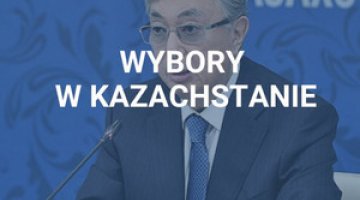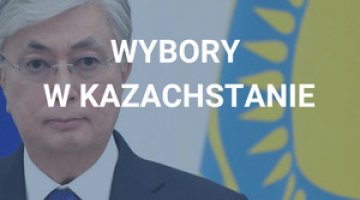Analyses
Kazakhstan after the elections: starting ‘Operation Succession’ while maintaining the current foreign and economic policy priorities
A range of measures taken by President Nursultan Nazarbayev since the presidential elections of 3 April has led to an unprecedented strengthening of his son-in-law Timur Kulibayev’s position. Kulibayev has, among other things, become president of the Samruk-Kazyna holding company (a structure which plays an important role in shaping the country’s economic policies), and has thus become de facto the most important candidate to replace Nazarbayev as head of state. It seems that the decision on the succession has already been taken, although the mechanism to implement this remains unclear. At the same time, keeping Karim Masimov in his position as head of the government, and the minor changes to the cabinet’s composition, indicate that Kazakhstan will stick to its existing foreign and economic policy.
Preparations for the succession
In accordance with the constitution, the formal consequence of the presidential elections in Kazakhstan was the government’s resignation on 8 April, which 70-year-old President Nazarbayev used as a pretext to carry out a series of personnel changes. The President’s moves have strengthened the position of his son-in-law Timur Kulibayev.
The most important of these was the appointment of Kulibayev as head of the Samruk-Kazyna holding company, which manages the most important public companies in Kazakhstan, including the KazMunaiGaz oil and gas company. The value of the holding’s assets is approximately US$80 billion, and the companies which it supervises produce around 70% of Kazakhstan’s GDP. In practice, Samruk-Kazyna serves as a ‘parallel’ government in the economic field, and plays an important part in devising the country’s economic policy. In addition, Kulibayev’s position has been strengthened by the transfer of additional competences to the National Bank of Kazakhstan, which is run by Grigory Marchenko; he was previously head of the Halyk Bank, which belongs to Kulibayev and his wife.
The decision to appoint Kulibayev as head of Samruk-Kazyna (he had previously been its deputy head) not only strengthens his position (as he has now obtained a formal instrument of control over the economy), but will also oblige him to make public appearances. Kulibayev had hitherto been considered the most important person in Kazakhstan’s energy sector, but had not performed any public function; this meant he could remain in the shadows, and had no public media presence of any kind. Moreover, if the President’s inner circle succeeds in its plan to create a party based on the business lobbying group Atameken (which Kulibayev runs), he will be able to participate in the political field (the next parliamentary elections are to be held in 2012), which could increase his popularity with the public. Kulibayev’s chances as the potential successor are also bolstered by the fact that the other would-be candidates (such as the mayor of Astana, Imangali Tasmagambetov) are in a much weaker position than he is.
However, this scenario may be affected by Kulibayev himself, whose ambition and loyalty must be thoroughly tested by Nazarbayev. The ‘technical’ aspects of the succession process have not been specified either; for example, Kulibayev could become either President or Prime Minister after the elections in 2016 (when both presidential and parliamentary elections will be held), but he may also take the helm of government earlier – this will depend on Nazarbayev’s own choice. However, it is clear that Nazarbayev’s role is beginning to extend beyond the presidency: he is now something akin to the ‘father of the nation’, a role served by his adoption of the title of ‘leader of the nation’ in 2010, and the production of a partially fictional film biography of him entitled "The heaven of my childhood".
A new-old government, with the same priorities
Kulibayev’s strengthened position is of great importance to the question of who will succeed Nazarbayev. However, the President’s other decisions, such as leaving Prime Minister Karim Masimov in his position, and the minor changes to the government (changes have been made in the foreign, economy and agriculture ministries), indicate that the President is generally satisfied with the government’s actions, and that Kazakhstan’s previous policy priorities remain unchanged.
Astana will still have to pursue a cautious policy of manoeuvring between Russia and China. Kazakhstan will seek to dynamically balance its increasing economic cooperation with China by strengthening its relationship with Russia; its membership of the Common Economic Space (created jointly with Russia and Belarus) is an expression of the latter. Astana will also emphasise the importance of its cooperation, primarily political, with Moscow (especially in the short term, due to the large potential destabilisation in the region caused by the Kyrgyzstan and Tajikistan situations), while at the same time seeking to increase its own room for manoeuvre by developing relationships with other players, namely the West and China. Cooperation will also continue with yet other partners: India, East Asia and the Arab countries, which may bring economic benefits and prestige. In foreign policy realm, Nazarbayev’s aim remains the improvement of Kazakhstan’s international position and strengthening its image by taking prestigious initiatives, such as last year's chairmanship of the OSCE, and organising the anniversary celebrations for the Shanghai Organisation in 2011, as well as the continually discussed proposal to locate a nuclear fuel bank in Kazakhstan under the auspices of the IAEA.
In the economic sphere, the government will continue its existing efforts to reduce the proportion of energy industries in the structure of the country’s GDP. Great emphasis is supposed to be placed on developing the processing of raw materials, and on technological innovations. Due to the slow pace of this process, we must expect increased pressure on foreign investors to make investments in these fields (one example may be Chevron’s investment in wind power, as announced by the President’s Administration).
Summary
The measures to strengthen Kulibayev, the minimal changes to the government and the maintenance of existing priorities are good news for foreign investors. Nazarbayev’s moves are seen as measures to enhance the stability and predictability of Kazakhstan. This opinion is also shared by a large part of the public, which is generally satisfied with Nazarbayev’s government; the distribution of profits from the export of oil and other raw materials among Kazakhstan’s public is more balanced than in Russia or in Azerbaijan. In this context, Kazakhstan is an exception in Central Asia.
At the same time, however, the authorities’ actions indicate that Kazakhstan is uninterested in the Western model of democratic governance, and is proceeding along ‘its own way of development’.



